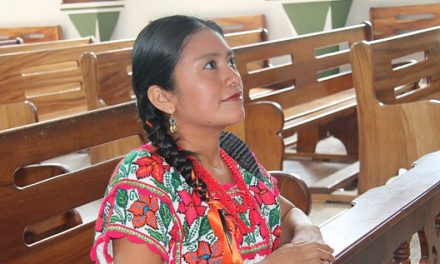I haven’t met many women who are chomping at the bit to be elders. I just haven’t. What I’ve mostly found is an entourage of women who love Jesus, feel called to teach His Word and struggle to find their place in the kingdom and ministry of our God. Now when I say teach I don’t mean just to children or only to women. It’s a bigger burden to share the things of God and insight into the Scripture with all people. Including men. Including youth.
One of many factors that I think that make this issue challenging is an imposition of our cultural and modern format of “church” to a the first century format of church. It’s the difference of Preacher, recipients of a couple hundred, a building, etc… as opposed to churches that meet in a home, gatherings of probably 20ish that have a leader, they meet in groups throughout the city, and there’s a smaller number of elders that give oversight to these groups. When a woman today talks about teaching or even preaching the Word, there is an instant picture of a pulpit minister. That picture causes many to bristle. In the first century when a woman spoke of preaching and teaching the Word, it was in a small house, sitting together in a circle around the living room or in a courtyard with everyone sharing something (1 Cor 14:26). It was normal.
Let’s look at this more fully– the women in the worship service and then the men’s role.
Women in the Worship Service
1) Everyone Was Expected to Contribute
Clearly and without a doubt, women were contributors in the worship service. If they weren’t so Paul wouldn’t have needed to tell them to pipe down and contribute in an orderly way (1 Cor 14:26-40, esp v. 40).
Everyone was expected to contribute and it actually means everyone.
“When you come together, everyone has a hymn, or a word of instruction, a revelation, a tongue or an interpretation. All of these must be done for the strengthening of the church” (1 Cor 14:26).
We do not see that women were excluded from bringing their gift to the church body. It’s why in 1 Cor 11 we read that Paul tells them that when they pray and prophesy and contribute, have their heads covered (a discussion for another day).
2) The Holy Spirit gave gifts to women
When the Holy Spirit was poured out, it said that women too would prophesy (Act 2:17-18). In fact, it almost makes a double emphasis on the fact that women will prophesy “your sons and daughters will prophesy” and then he says, “even on my servants, both men and women.” This was not to be overlooked. “Both” is a word of emphasis to make sure that one doesn’t miss what is being said. We see this confirmed with Philip’s four daughters who were considered prophetesses (Acts 21:9). We see this in the Corinthian church.
The whole purpose of gifts was to contribute. Gifts were for the body of Christ. In fact Paul says to be eager for gifts that build up the church (1 Cor 14). The Holy Spirit gave gifts to everyone for the strengthening of everyone else.
3) Everyone in the Church has a Gift to Give the greater Body
Nowhere do we see the gifts categorized via gender.
Rom 12:4 For just as each of us has one body with many members, and these members do not all have the same function, 5 so in Christ we, though many, form one body, and each member belongs to all the others. 6 We have different gifts, according to the grace given to each of us. If your gift is prophesying, then prophesy in accordance with your[a] faith; 7 if it is serving, then serve; if it is teaching, then teach; 8 if it is to encourage, then give encouragement; if it is giving, then give generously; if it is to lead,[b] do it diligently; if it is to show mercy, do it cheerfully.
1 Corinthians 12 Now about the gifts of the Spirit, brothers and sisters, I do not want you to be uninformed. 2 You know that when you were pagans, somehow or other you were influenced and led astray to mute idols. 3 Therefore I want you to know that no one who is speaking by the Spirit of God says, “Jesus be cursed,” and no one can say, “Jesus is Lord,” except by the Holy Spirit.
4 There are different kinds of gifts, but the same Spirit distributes them. 5 There are different kinds of service, but the same Lord. 6 There are different kinds of working, but in all of them and in everyone it is the same God at work.
7 Now to each one the manifestation of the Spirit is given for the common good. 8 To one there is given through the Spirit a message of wisdom, to another a message of knowledge by means of the same Spirit, 9 to another faith by the same Spirit, to another gifts of healing by that one Spirit, 10 to another miraculous powers, to another prophecy, to another distinguishing between spirits, to another speaking in different kinds of tongues,[a] and to still another the interpretation of tongues.[b] 11 All these are the work of one and the same Spirit, and he distributes them to each one, just as he determines.
Eph 4: 11 So Christ himself gave the apostles, the prophets, the evangelists, the pastors and teachers, 12 to equip his people for works of service, so that the body of Christ may be built up 13 until we all reach unity in the faith and in the knowledge of the Son of God and become mature, attaining to the whole measure of the fullness of Christ.
Culturally if a woman is given the gift of serving, encouragement, giving and living generously, there is a readiness by all to encourage that gift. But what if the gift is teaching? Or prophesying? Does Scripture make a gender distinction? No.
Men in the Worship Service
Men have a vital role in the worship service. And an important one.
1) They were Contributors to the Worship Service
Men were expected to be contributors with what the Lord brought them.
“When you come together, everyone has a hymn, or a word of instruction, a revelation, a tongue or an interpretation. All of these must be done for the strengthening of the church” (1 Cor 14:26).
There wasn’t allowance for passivity but for active contribution.
2) To Function With Their Gifts for the Strengthening of the Church
Both men and women were given gifts. And both men and women were given spiritual gifts as noted above. These too were given by the Holy Spirit and all men were expected to contribute in the worship service and to the greater good of those in the body of Christ.
3) To Bring Leadership
There are some who would say that there is no difference between men and women’s roles but I would beg to differ. I do believe that the Elders and Deacons are male leadership. Here’s why: It says the overseer must be a “one-woman man” (1 Tim 3:2). It says the same for deacons (1 Tim 3:12). It appears to me fairly clearly that the overseers were to be men. It even talks about their wives. All of this brings up several questions.
What about the wives?
This is an issue that I would like to write a whole article about! What happens when there is someone who is a great church leader/pastor/minister and the wife just isn’t someone of reputable character? This happens a lot. But clearly the wives were to be of noble character as well. They were to be “women worthy of respect, not malicious talkers but temperate and trustworthy in everything” (1 Tim 3:11).
Why was this? It wasn’t because she needed to have character to cook and clean well. It’s because when someone is married, ministry happens together. It’s the way it works. As a woman and a man are yoked together, so is their ministry. They minister together. If a man was qualified by his character and the woman wasn’t, I don’t know that they are ideal candidates for ministry. It’s tough and it is something I’ve seen locally.
What about Phoebe? Wasn’t she a deaconess?
Rom 16:1 describes Phoebe in the Greek as deaconness or a servant. I think yes, she was a deaconess. But I think it was more of a descriptor than an official role (though we don’t know for sure). Just as there were apostle but then there were The Apostles (The Twelve), I think there are servants/deacons and then there are the Deacons who are chief among servants and have that role. Again, it’s about seeing this in the context of house churches and not modern day churches.
4) To provide leadership and education in the home (1 Cor 14; 1 Tim 2:1-11).
It was the responsibility of the men to make sure their wives were educated and brought up to speed. Women had more than likely not been given the same education opportunities as men, and therefore Paul instructed the women to get that education and for their husbands to take the leadership and initiative to make it happen.
Summation
The bigger question for me in this is what was the leadership roles in the church? To keep women silent or release them and bring oversight? To suppress tongue-speakers and prophets or to release them in an orderly way? How were they to handle false-teachers? Distance and cut them off from the church or work to redeem them? When do you do what?
We talk often of women’s role in the church, but I think we have missed the bigger picture: The Leader’s Role (and the Man’s Role) in the Church in Relationship to Women






